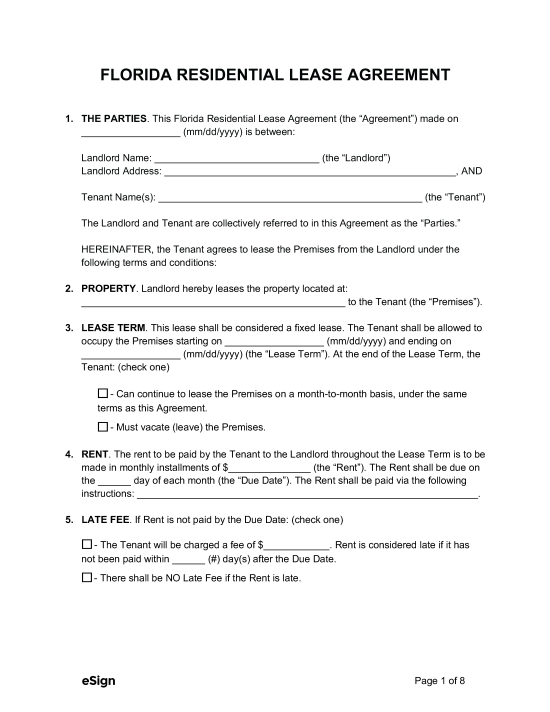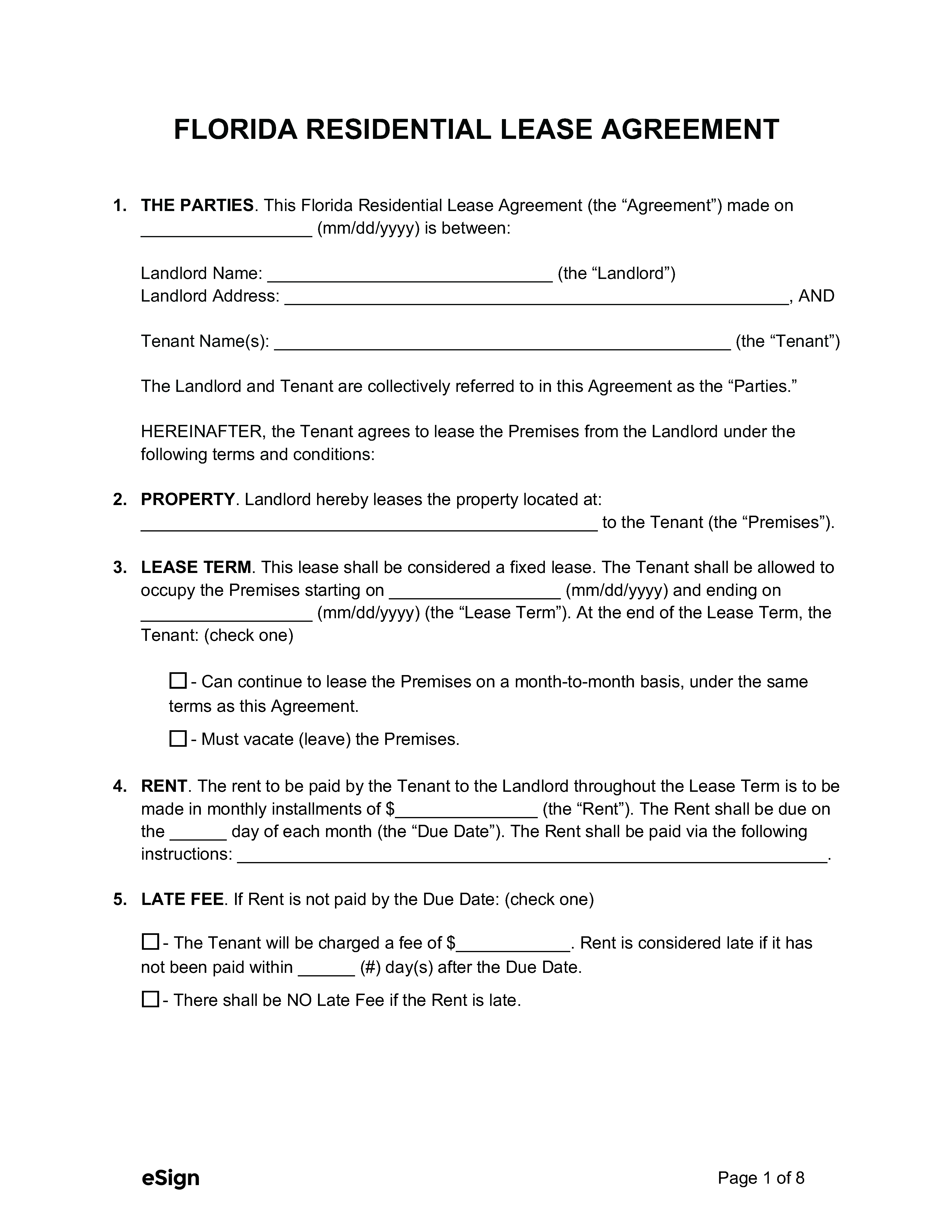Rental Application – Used to collect background information from lease applicants so the landlord can find the most suitable tenant for their property.
Lease Agreements: By Type (7)
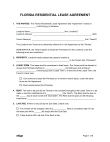 Standard (1-Year) Lease Agreement – Used to establish a rental arrangement where the landlord leases residential property to a tenant for one year. Standard (1-Year) Lease Agreement – Used to establish a rental arrangement where the landlord leases residential property to a tenant for one year.
Download: PDF |
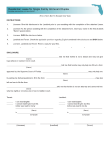 Association of Realtors Version – A fixed-term residential lease designed in collaboration between the Florida Association of Realtors and the Florida Bar. Association of Realtors Version – A fixed-term residential lease designed in collaboration between the Florida Association of Realtors and the Florida Bar.
Download: PDF |
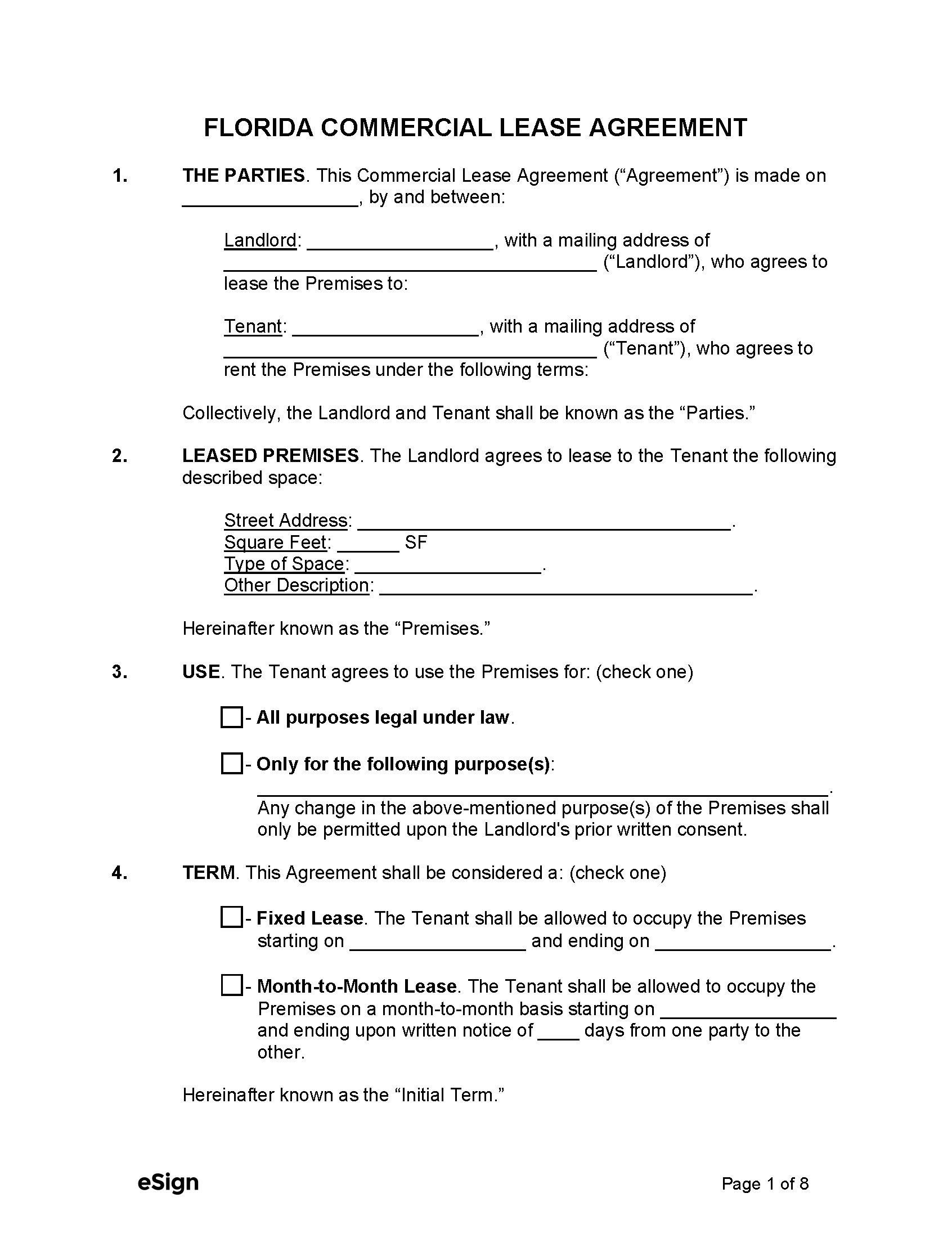 Commercial Lease Agreement – This lease allows a commercial property landlord to rent out an office, retail space, or other non-residential unit to a business tenant for a fixed term. Commercial Lease Agreement – This lease allows a commercial property landlord to rent out an office, retail space, or other non-residential unit to a business tenant for a fixed term.
Download: PDF, Word (.docx), OpenDocument |
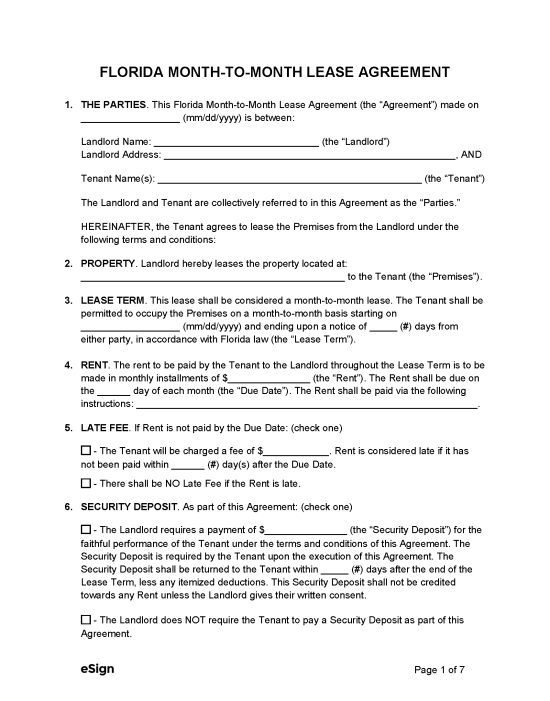 Month-to-Month Lease Agreement – An open-ended residential lease that renews automatically each month and can be terminated by the landlord or tenant without cause. Month-to-Month Lease Agreement – An open-ended residential lease that renews automatically each month and can be terminated by the landlord or tenant without cause.
Download: PDF, Word (.docx), OpenDocument |
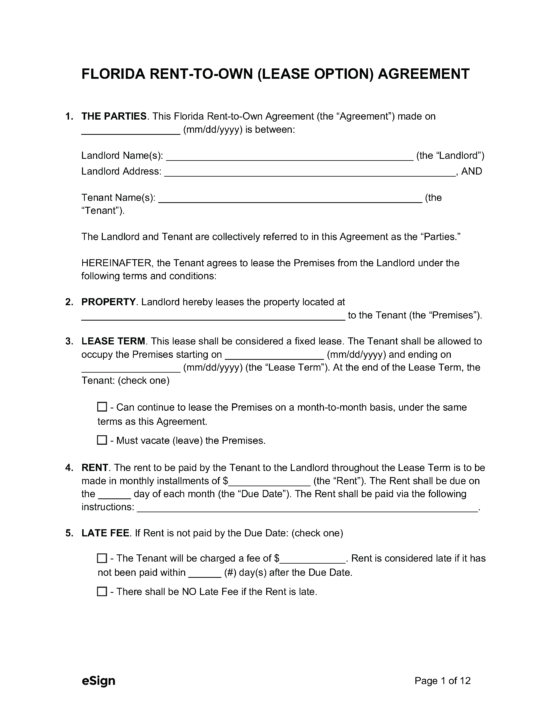 Rent-to-Own Agreement (Lease Option) – An ordinary lease with additional terms that allow the tenant to buy the rented property. Rent-to-Own Agreement (Lease Option) – An ordinary lease with additional terms that allow the tenant to buy the rented property.
Download: PDF |
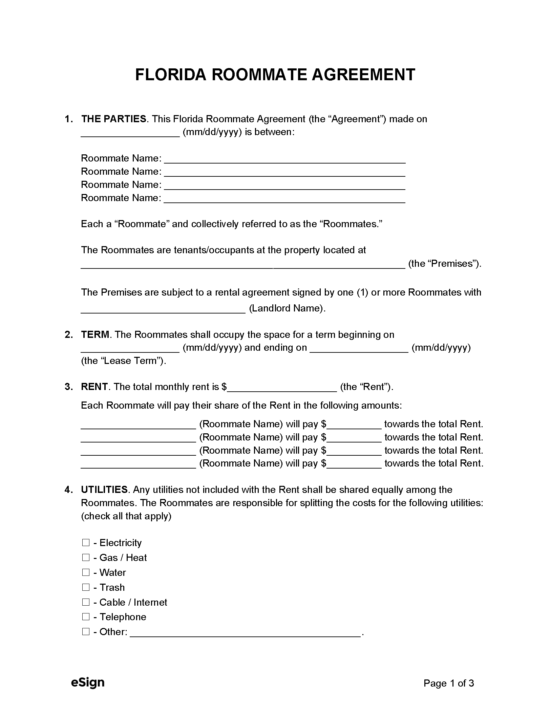 Roommate Agreement – A contract separate from the original lease that helps establish an agreeable living arrangement between roommates. Roommate Agreement – A contract separate from the original lease that helps establish an agreeable living arrangement between roommates.
Download: PDF, Word (.docx), OpenDocument |
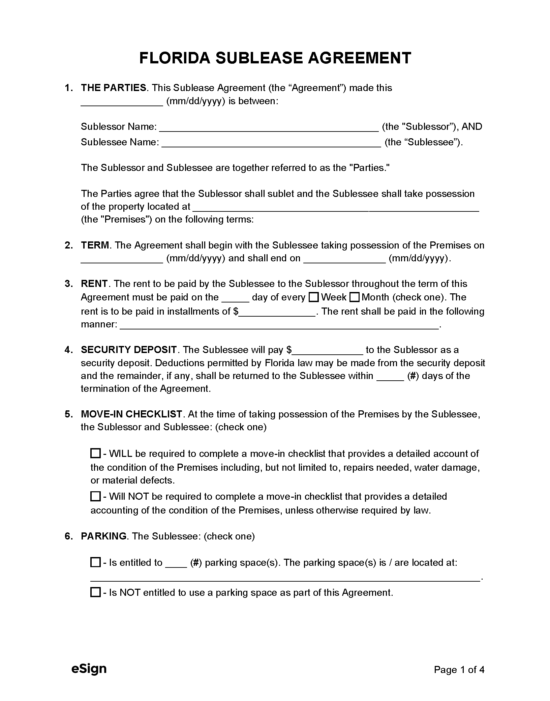 Sublease Agreement – A tenant can use this agreement to rent their living space to another individual (subtenant) with the landlord’s permission. Sublease Agreement – A tenant can use this agreement to rent their living space to another individual (subtenant) with the landlord’s permission.
Download: PDF, Word (.docx), OpenDocument |
Required Disclosures (4)
- Identification – The names and addresses of the individuals responsible for sending and receiving notices must be provided to all tenants before the commencement of a lease.[1]
- Lead-Based Paint Disclosure (PDF) – If a property was constructed before 1978, the owner must provide this disclosure to tenants to report whether lead paint exists on the premises.[2]
- Radon (PDF) – Before a lease agreement can be executed, landlords must provide all tenants with a radon gas disclosure.[3]
- Security Deposit (PDF) – Landlords with five or more individual residential units must provide tenants with a written notice about their security deposits. Unless included in the lease, the notice must be issued within 30 days after collecting the deposit.[4]
Security Deposits
Maximum Amount ($) – Florida has no specific laws limiting the amount landlords can charge as a security deposit.
Collecting Interest – Interest is not required but may be collected as long as the tenant receives either 75% of the annualized average interest rate or 5% simple interest each year.[5]
Returning to Tenant – The landlord is given 15 days to return the security deposit (plus any interest) after the tenant moves out.[6]
- Exception – If the landlord plans to use the security deposit to pay for damages, they must notify the tenant within 30 days of moving out. The tenant has 15 days to object, and if no objections are raised, the remaining funds must be returned within 30 days from the initial notice date.[7]
Itemized List Required? – Yes, if the landlord deducts from the deposit, they must provide the tenant with a written statement explaining the reason and amount of each deduction.[8]
Separate Bank Account? – Yes, security deposits must be deposited in a Florida bank account, and the money cannot be mixed with other funds.[9]
Landlord’s Entry
General Access – Landlords are allowed to enter as long as they give reasonable notice. For repairs, reasonable notice is considered to be at least 24 hours.[10]
Immediate Access – Florida landlords can enter a tenant’s dwelling without notice if there’s an emergency, for the protection/preservation of the premises, or if the tenant is absent for longer than one-half of the payment period.[11]
Rent Payments
Grace Period – Florida law doesn’t mention a grace period. Unless the lease specifies otherwise, payments are due at the start of each rental period.[12]
Maximum Late Fee ($) – There are no laws that define a maximum late rent fee. Landlords can charge any amount, but unreasonable fees may not be enforceable in court.[13]
Bad Check (NSF) Fee – If the tenant issues a bad check, the landlord can charge the greater of 5% of the check amount or a flat fee as follows[14]:
- $25 fee for checks of $50 or less
- $30 fee for checks greater than $50 but less than $300
- $40 fee for checks exceeding $300
Withholding Rent – Tenants may be allowed to withhold rent if the landlord doesn’t do what the lease or law requires. However, before doing so, tenants must inform the landlord and give them seven days to fix the issue.[15]
Breaking a Lease
Non-Payment of Rent – Landlords are required to issue a 3-day notice before ending a lease due to unpaid rent.[16]
Non-Compliance – A 7-day notice is needed to break a lease following a rental violation by the tenant.[17]
Lockouts – Unless the tenant abandons the property or is evicted through a court order, the landlord cannot change the locks or otherwise restrict access to the tenant’s rental unit.[18]
Leaving Before the End Date – The landlord is given the following options when a tenant abandons the rental unit[19]:
- Terminate the rental agreement
- Do nothing while holding the tenant liable for the remaining rent payments
- Re-rent the property while holding the tenant liable for rent owed during the vacancy
- Charge liquidated damages or an early termination fee of up to two months’ rent (these charges must be specified in the lease)
Lease Termination
Month-to-Month Tenancy – A 30-day notice is required to terminate a month-to-month tenancy in Florida.[20]
Unclaimed Property – The landlord must send the tenant a written notice describing their abandoned belongings, including potential storage fees and collection details. Tenants must claim their property within 10 days if the notice is delivered in person or 15 days if it’s sent by mail.[21]
- Sale of Unclaimed Property – Property not claimed within the notice period must be sold at a public auction. However, if the property is worth less than $500, the landlord can keep or dispose of it.[22]
